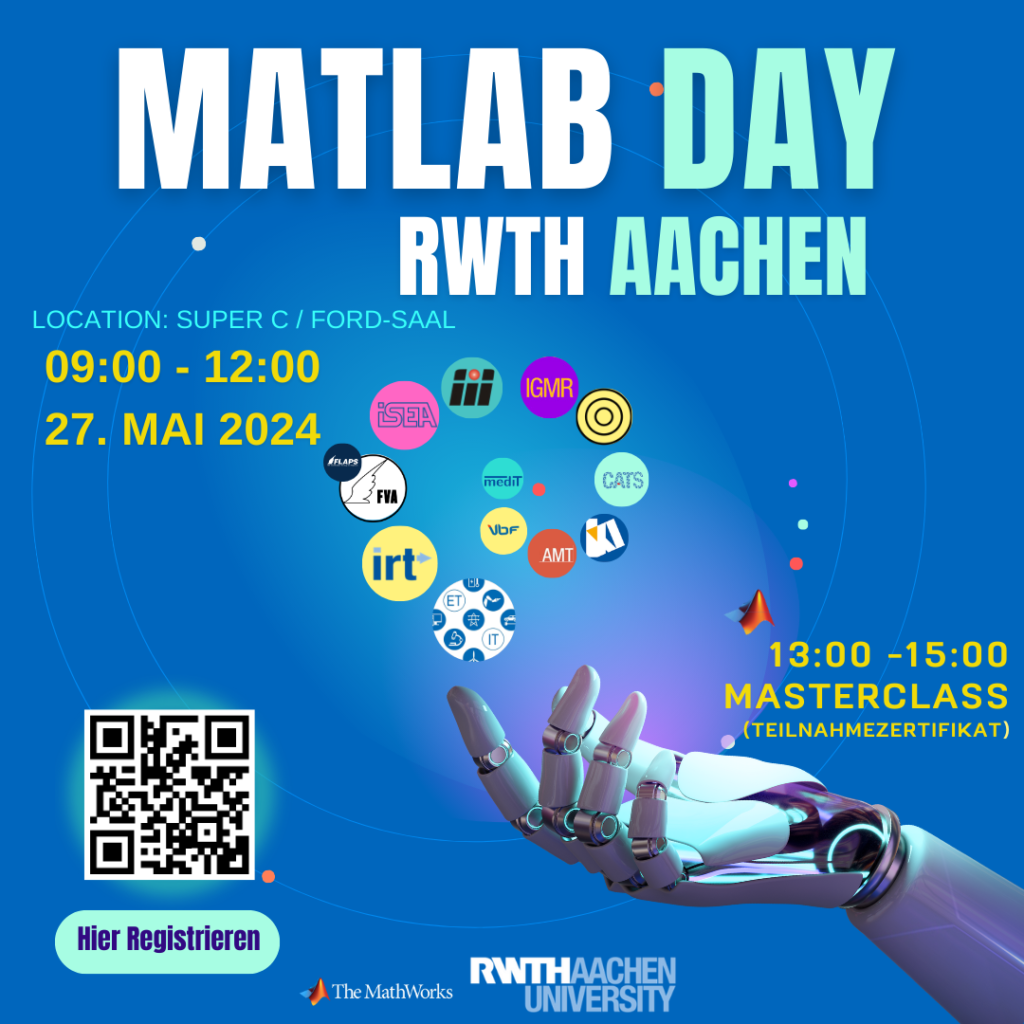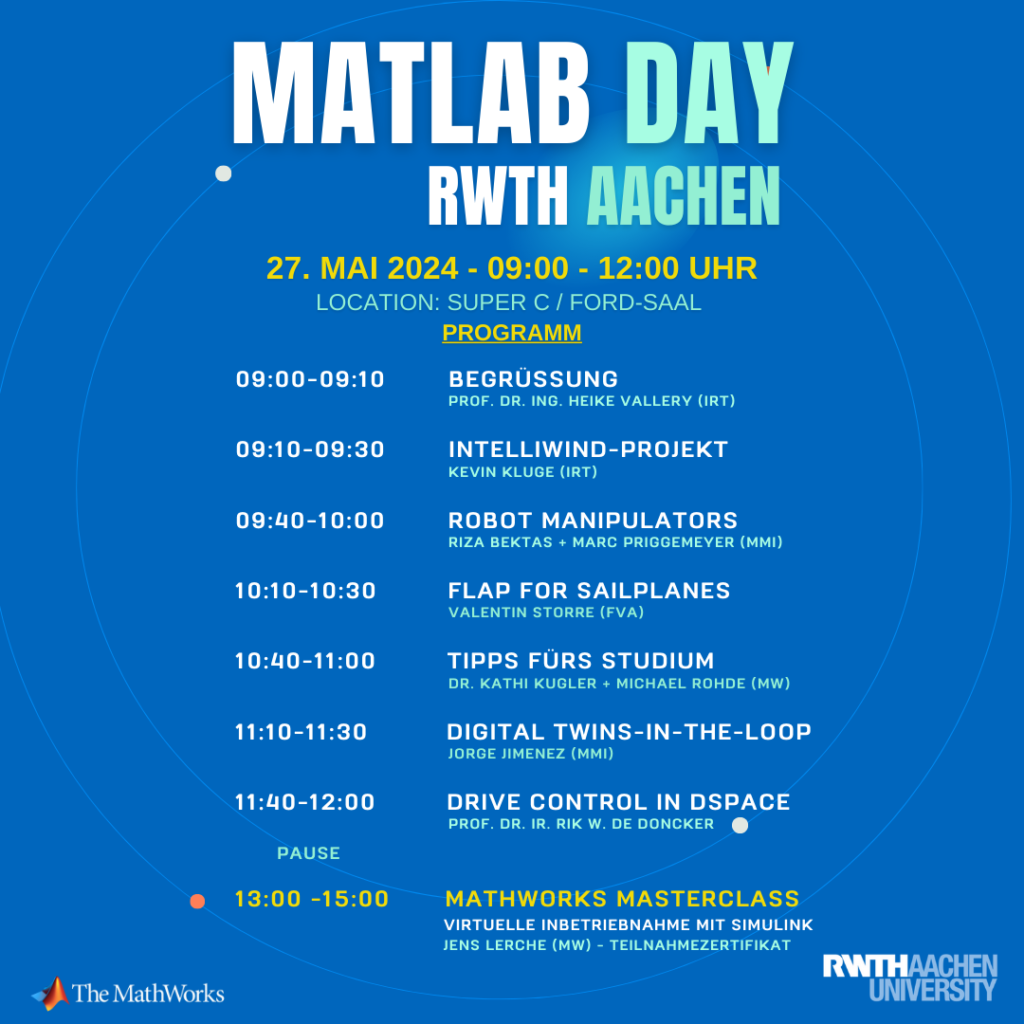60 Years | IKS
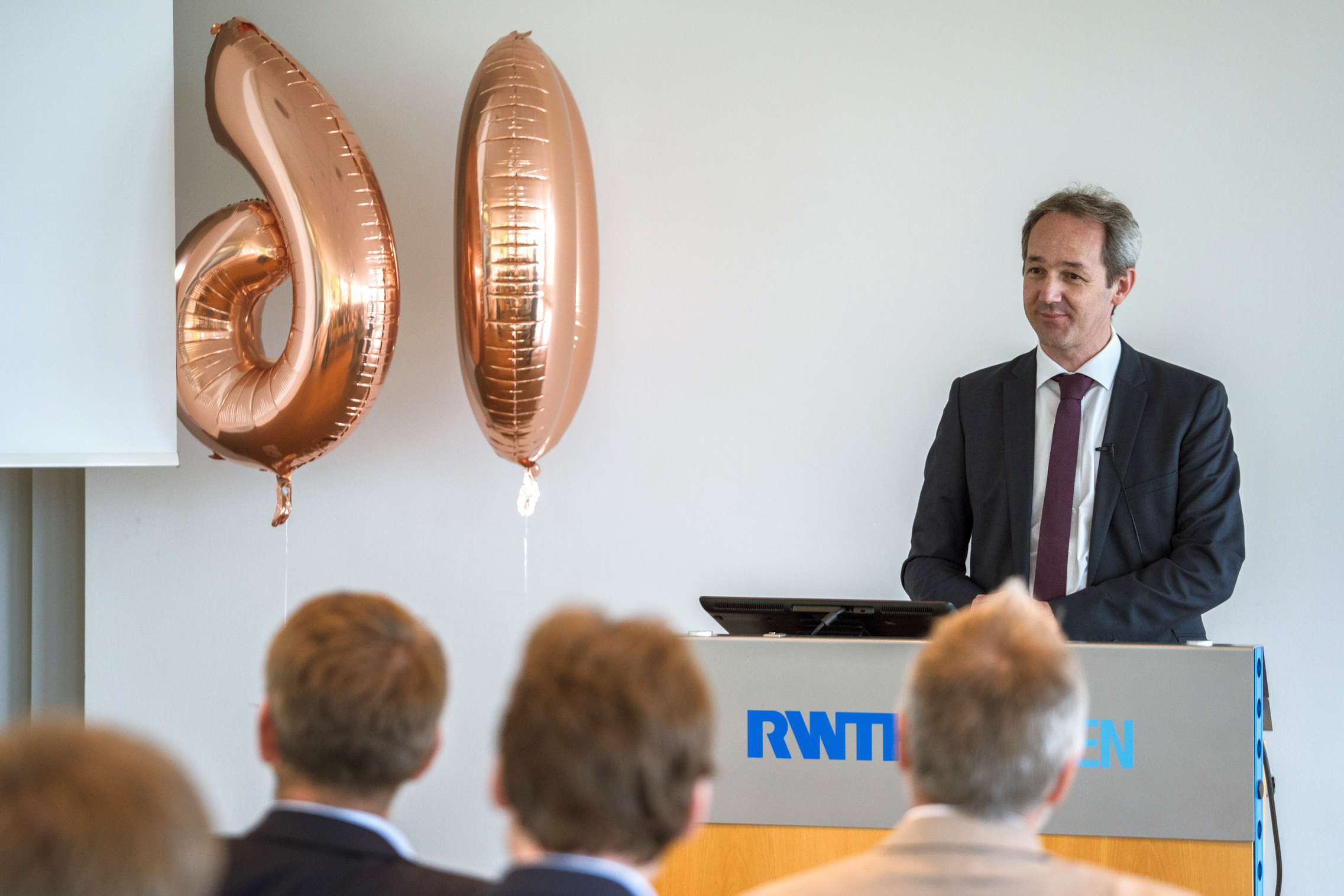
Prof. Dr.-Ing. Peter Jax, Head of the Institute of Communication Systems. © IKS
On 14 June 2024, the Institute of Communication Systems (IKS) celebrated its 60th anniversary.
This anniversary was celebrated together with project partners, colleagues and numerous alumni in a festive colloquium and evening event. The event provided an insight into the development of digital speech and audio communication. It was also an opportunity to look back over the past six decades and to discuss future challenges and opportunities in the field of communication systems.
“We would like to thank everyone who has supported the Institute over the past 60 years and look forward to many more successful years,” the IKS announced.
Professor Jax has led the Institute since 2015. He initiated a new name and a research focus on modern digital communication systems. Research continues to focus on speech and audio communication as probably the most important and natural link between us humans. The research deals with signal processing in communication systems, e.g. in hearing aids, hearables or immersive 3D telephony. The aim is to make digital communication systems as natural as “direct” face-to-face speech communication. Both model-based digital signal processing and machine learning methods are used in innovative hybrid solutions.
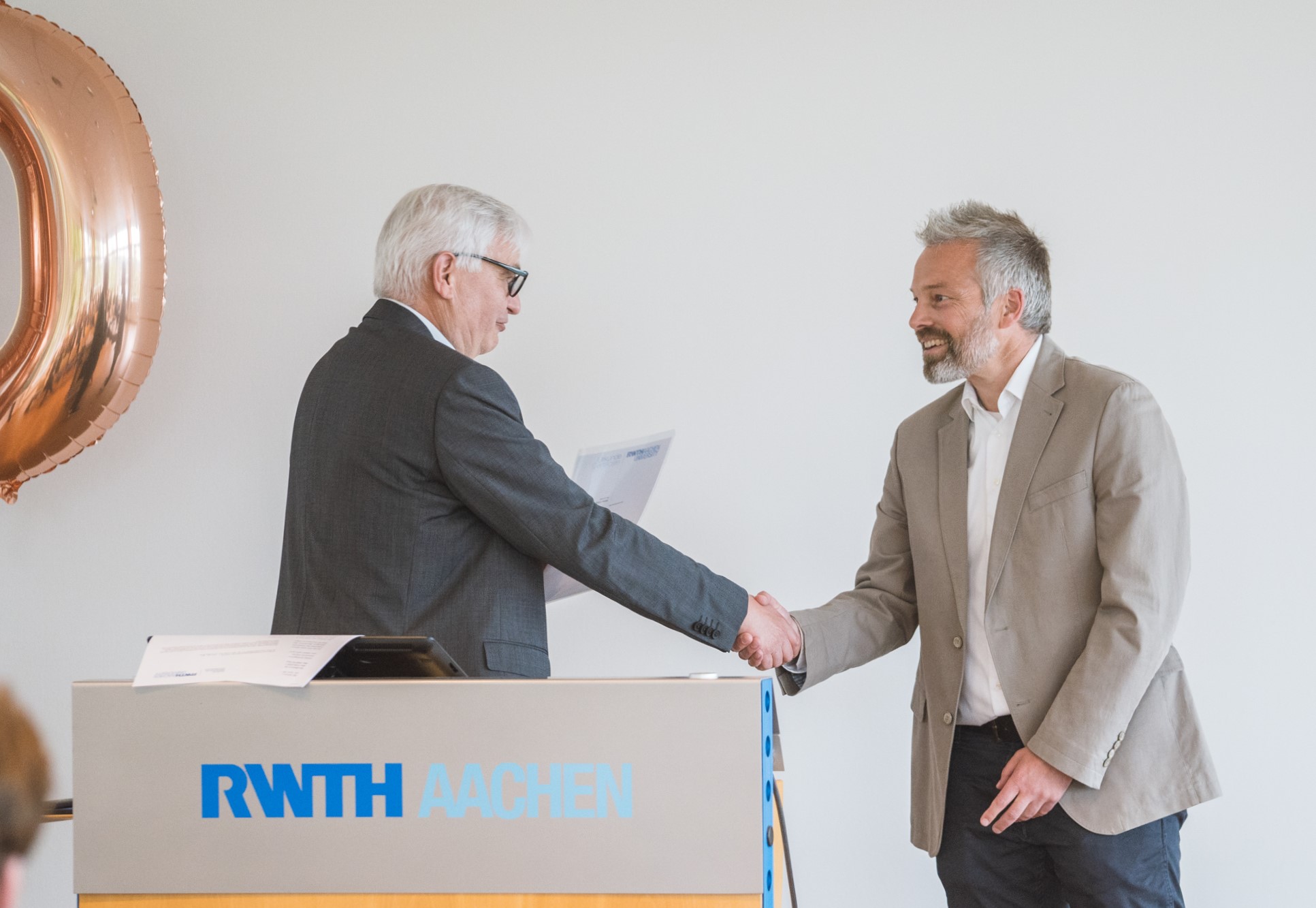
Prof. Dr.-Ing. Albert Moser, Dean of the Faculty of Electrical Engineering and Information Technology and Prof. Dr.-Ing. Marc Adrat, Research Group Manager for Software Defined Radio (SDR) at the Fraunhofer Institute for Communication, Information Processing and Ergonomics (FKIE) in Wachtberg and lecturer at the IKS at RWTH Aachen University. © IKS
One of the highlights of the event was the formal appointment of Marc Adrat as Honorary Professor. He is an internationally recognized expert in the field of Software Defined Radio, which involves programmable digital radio systems where essential transmission functions such as coding, error correction, modulation, and synchronization are implemented via software. His teaching activities focus on modern error-correcting channel coding in the course „Modern Channel Coding for Wireless Communications“, which is offered as part of the regular „Master’s programme in Electrical Engineering and Information Technology“.
“His expertise and commitment will undoubtedly continue to have a significant impact on the quality of our teaching and research,” stated the IKS.
The appointment will also strengthen the collaboration between the Faculty of Electrical Engineering and Information Technology and the Fraunhofer Institute for Communication, Information Processing and Ergonomics.
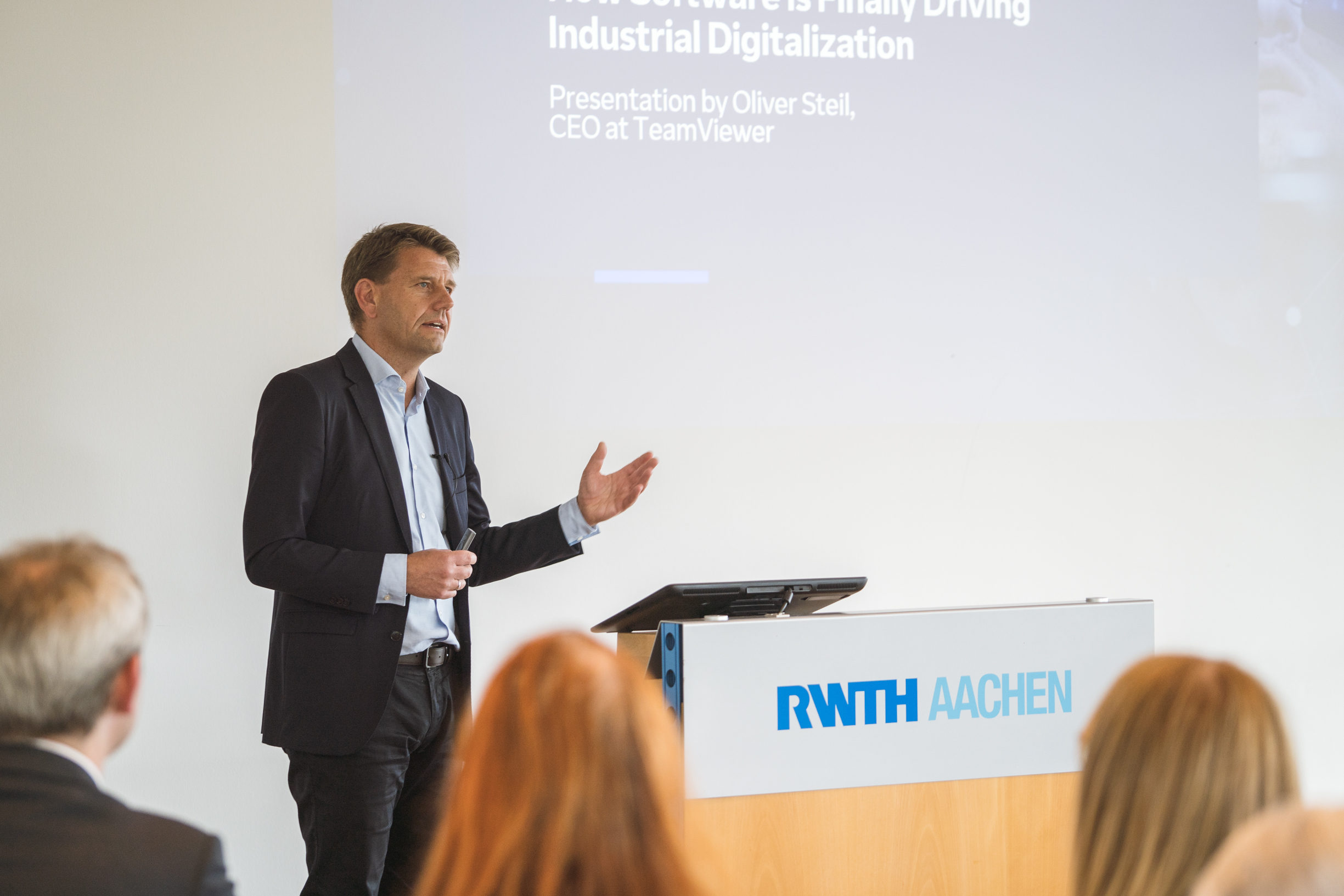
Oliver Steil, former employee of the IKS and current CEO of TeamViewer. © IKS
Another highlight was Oliver Steil’s presentation entitled “Digital Twins, AI, Spatial Computing, et al. – How Software is Finally Driving Industrial Digitalization”. He also spoke about his personal career, which is rooted in the Institute and ultimately led Oliver Steil to his current position as CEO of TeamViewer. The guest of honour provided fascinating insights into the challenges and opportunities of leading a global technology company.
The presentation ended with a lively question and answer session, where attendees had the opportunity to speak directly to Oliver Steil. Questions ranged from specific technical aspects to strategic considerations.
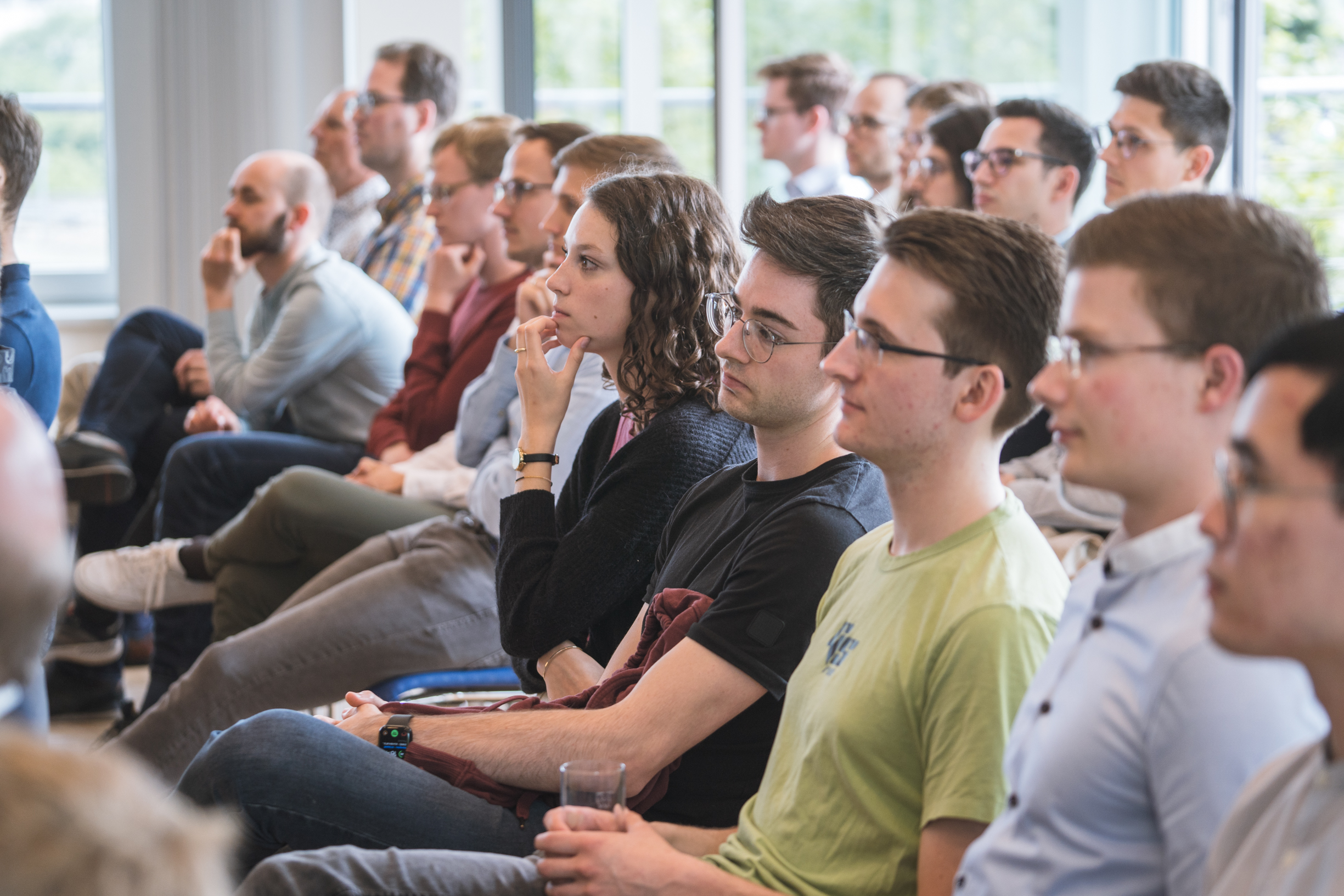
© IKS
Further information can be found on the homepage of the Institute of Communication Systems.
WirtschaftsWoche University Ranking 2024 confirms excellent reputation in the business world
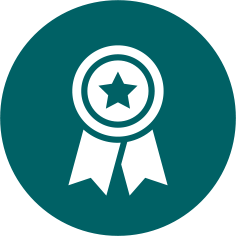
Electrical engineering graduates will have excellent career opportunities in the coming years. But where can prospective students expect the best education?
The consulting firm Universum asked 483 corporate recruiters which university best prepares its graduates for the needs of their companies. The results confirm the outstanding role of RWTH Aachen University in research and teaching: a degree from RWTH is seen to provide optimal preparation for professional life and its associated demands on graduates. Electrical engineering at was ranked third in Germany. About one-third of the surveyed recruiters indicated that they would prioritize hiring graduates from RWTH.
New lecture in the series ‘Colloquium Biomedical Engineering and Related Fields’
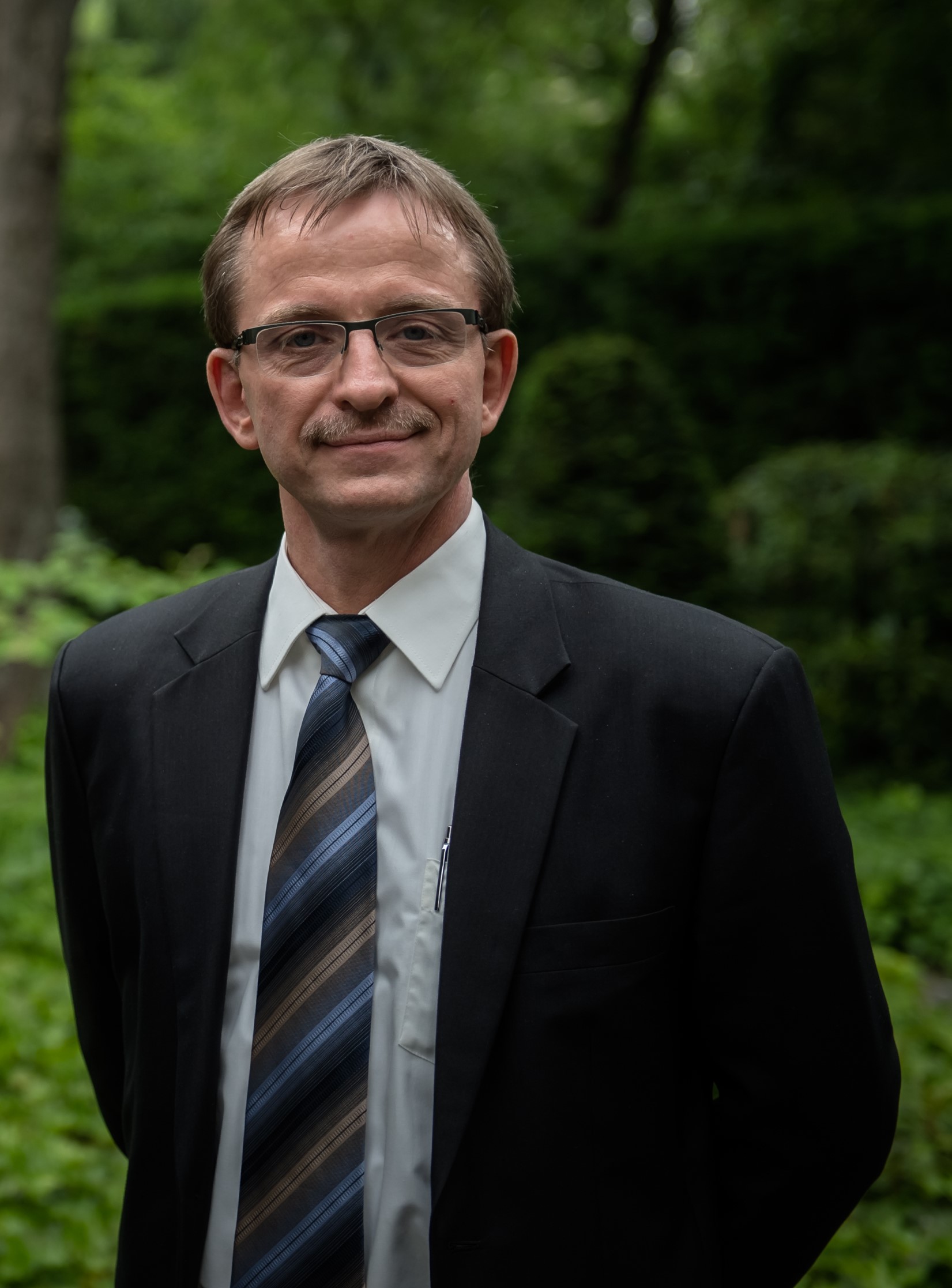
© Andreas Endermann
Professor Steffen Leonhardt, holder of the Chair of Medical Information Technology (MedIT) at the Helmholtz Institute for Biomedical Engineering at RWTH Aachen University, will moderate the new lecture: ‘Continuous In-Vehicle Health Monitoring Enabled with Multimodal Signal Fusion’ on 11 July 2024.
We are delighted to welcome Dr Joana M. Warnecke from the Peter L. Reichertz Institute for Medical Informatics at the Technical University of Braunschweig and the Hannover Medical School. Dr Warnecke will present her pioneering research into continuous health monitoring in vehicles. Her work focuses on the development of a redundant sensor system that enables reliable measurement of heartbeat and respiration rate. These systems use a Convolutional Neural Network (CNN) based architecture for data fusion and take into account additional sensors such as steering wheel angle and acceleration to improve signal quality.
“Our findings indicate that over half of the driving time can be utilized for in-vehicle heartbeat and respiratory rate monitoring, highlighting the efficiency and practicality of the proposed approach,”
states Warnecke.
This technology could make a significant contribution to the early detection of cardiovascular and chronic respiratory diseases by being seamlessly integrated into everyday life.
The ‘Colloquium on Biomedical Engineering and Related Areas’ is a regular series of events organised by RWTH Aachen University. The aim of the series is to provide an interdisciplinary education in these fields and to promote the interdisciplinary exchange of ideas. All students, clinicians, engineers and scientists are invited to attend this exciting lecture and exchange ideas with experts in the field of biomedical engineering.
The event will take place from 5 to 5:45 pm at the Helmholtz Institute for Biomedical Engineering at RWTH Aachen University, Pauwelsstraße 20, 52074 Aachen, Germany, seminar room 2.70. It will be coordinated by Prof. Dr. Klaus Radermacher, Chair of Medical Engineering, RWTH Aachen University. For further information please contact the secretariat at meditec@hia.rwth-aachen.de or call +49-(0)241-80 23870.
Michael Vorländer is new president of the ASA
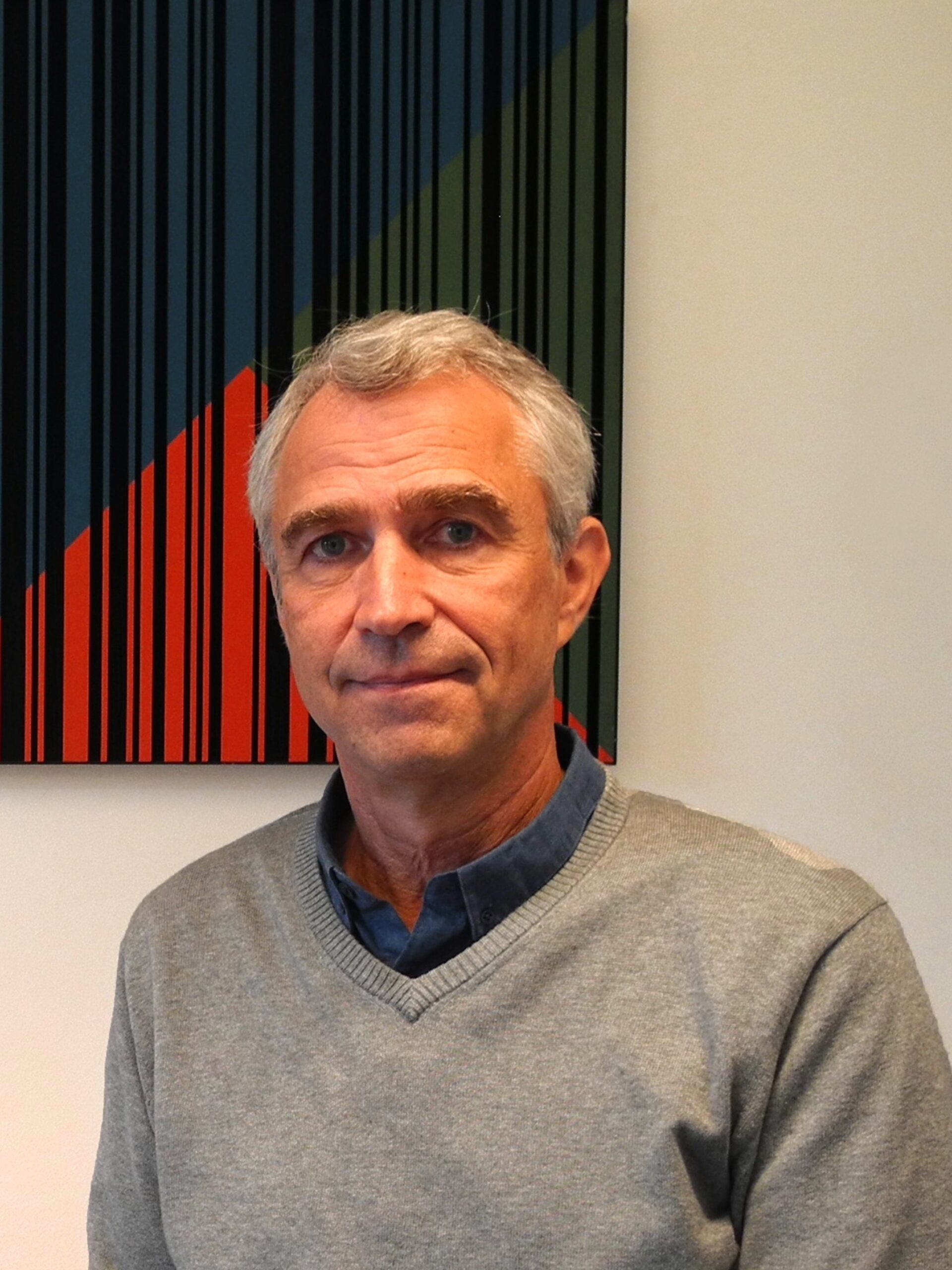
© IHTA
The first non-American president of the Acoustical Society of America (ASA) is Professor Michael Vorländer, Chair of Technical Acoustics at RWTH Aachen University.
Founded in 1929, the ASA is the world’s largest professional society in the field of acoustics. Professor Vorländer will serve as a member of the ASA Board of Directors from May 2024 to May 2027 and as President in 2025/2026.
“It is a great honour to be elected President of the ASA. Being the first non-American President is an important step for international cooperation in acoustics and underlines the increasing importance of international perspectives in the scientific community”,
says Vorländer.
With approximately 7,000 members, the ASA is dedicated to the advancement and dissemination of knowledge in the field of acoustics. The society covers a broad spectrum of acoustical disciplines, supports research, education and application of acoustical principles, develops standards and guidelines, organises conferences and publishes scientific journals such as the renowned “Journal of the Acoustical Society of America”.
For more information about the Acoustical Society of America, please visit their website.
ITAR team from the Chair of Distributed Signal Processing presented research project at the Hannover Expo
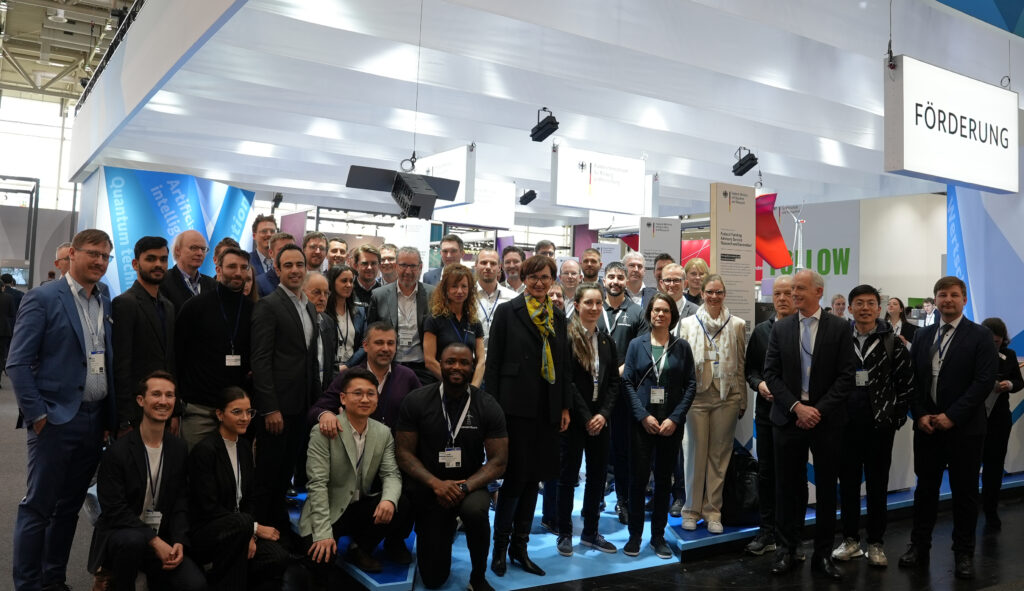
© Chair of Distributed Signal Processing
One of our chairs was also represented at the Hannover Messe this year. The ITAR team (Innovative Test Methods for Radio Systems Based on Augmented Reality Technologies) presented the cutting-edge research of the start-up from the Chair of Distributed Signal Processing at the stand of the Federal Ministry of Education and Research (BMBF) at the Hannover Expo in April.
ITAR, a branch of the 6G Research Hub, is funded by the Federal Ministry of Education and Research as part of the Startup.Connect programme. The team welcomed Minister Bettina Stark-Watzinger from the BMBF and State Secretary Prof Dr Sabine Döring as guests. Students, engineers and managing directors took the opportunity to see the team’s innovative solutions and share them with leading industry representatives. This prepared the way for future collaborations. We would like to thank the BMBF, familie redlich A.G. and the team at the Karlsruhe project management organisation for their support.
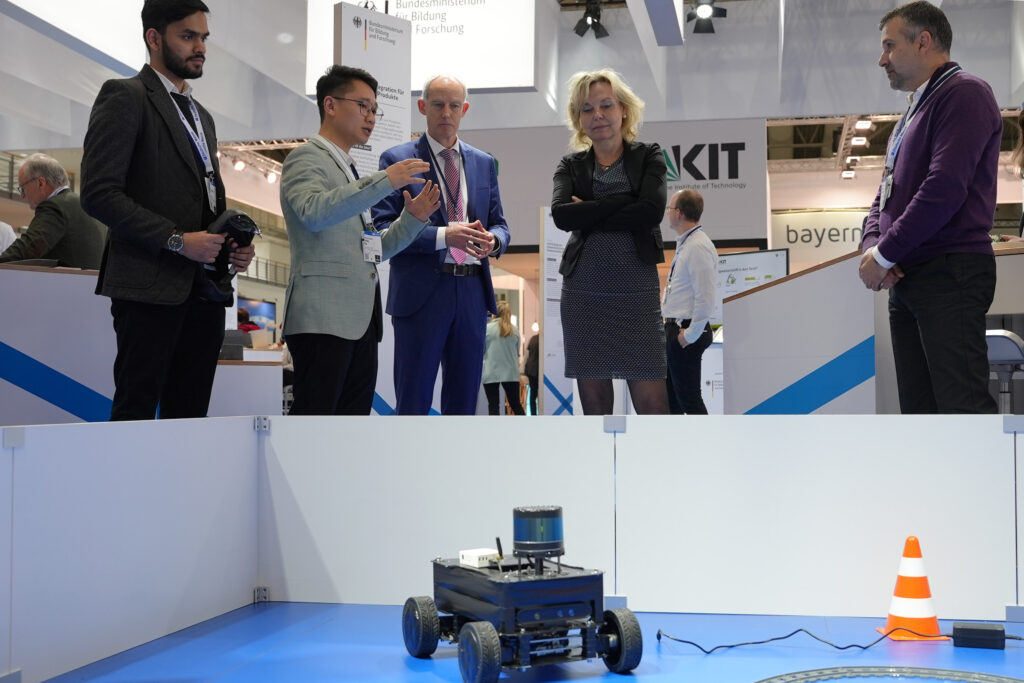
© Chair of Distributed Signal Processing
Further information on ITAR can be found on the chair’s website.
Tim Brimmers: Winner of the SEW-EURODRIVE Foundation Study Award 2023

Congratulations to Tim Brimmers, who will be awarded the 2023 Study Prize worth 2,500 euros at the Ernst Blicke Award Ceremony on 17 May 2024.
The Executive Board of the SEW-EURODRIVE Foundation selected Mr Brimmers as the winner in order to fulfil the Foundation’s purpose of honouring and making visible outstanding academic achievements of young people.
We, the Faculty of Electrical Engineering and Information Technology, are very proud to have such outstanding candidates as Tim Brimmers in our ranks.
Excellent researchers on an interdisciplinary stage: lecture by Professor Monti
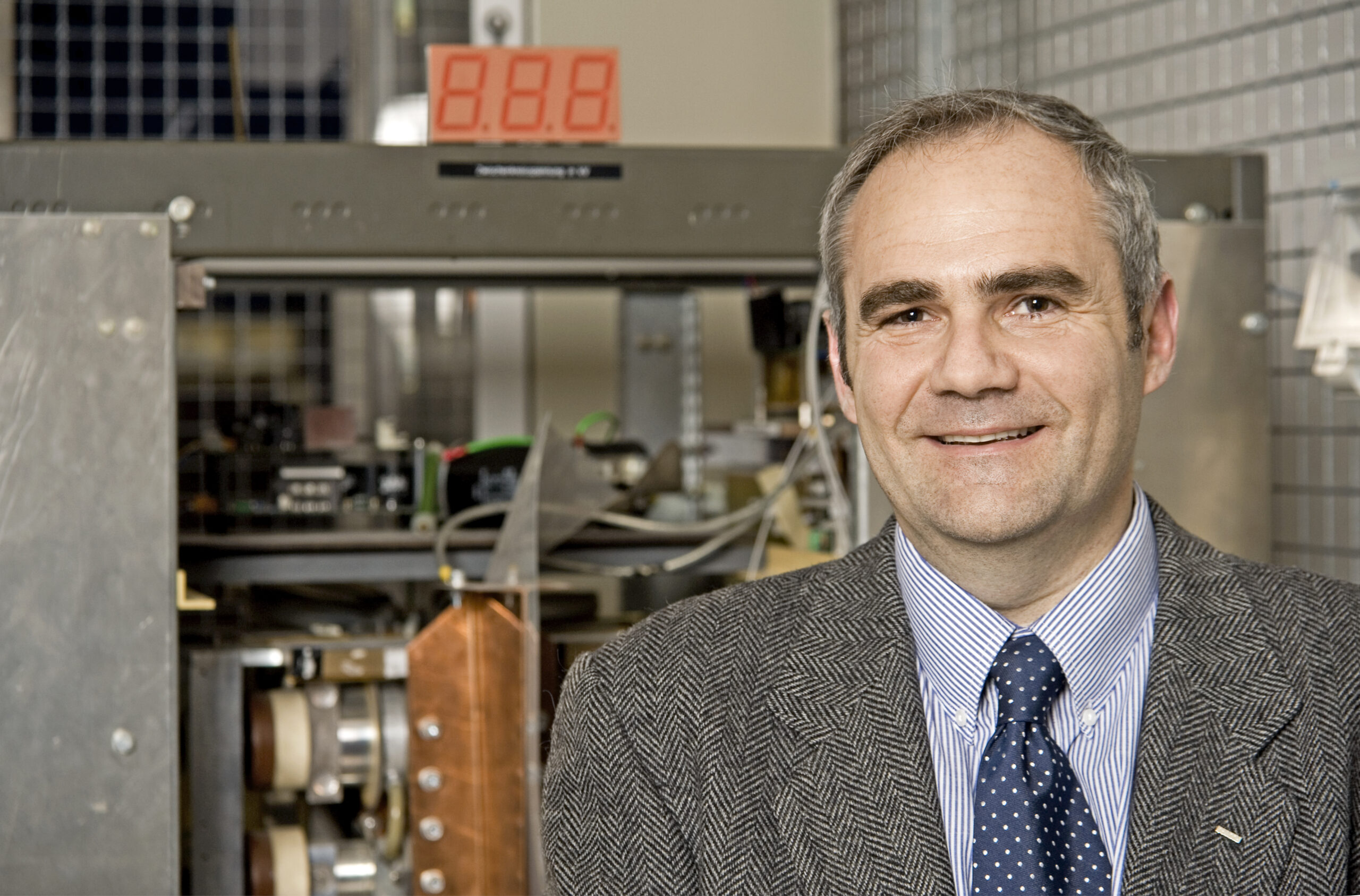
© Peter Winandy
On 17 April, Professor Antonello Monti of RWTH Aachen University will speak at the scientific meeting of the engineering and economics class of the “Nordrhein-Westfälische Akademie der Wissenschaften und der Künste” about the development goals of his discipline in terms of solving major societal challenges.
Against the background of the international situation, the energy transition process is more important than ever.The necessary technological transformation of the energy system must be approached from two angles: On the one hand, a new major player in energy supply has emerged: renewable energy. On the other hand, there are new consumers such as electromobility and heat pumps. Digitalisation is proving to be a key enabler in this process. You could even say that digitalisation is not an option, but a necessity. The power system is consequently becoming a large, programmable cyber physical infrastructure with a high level of complexity. In his presentation “The Digitalisation of the Energy Systems: from the electrons to the cloud”, Professor Monti addresses this complexity by analysing the solutions currently being developed for the different levels of the infrastructure.
” Rethinking the whole architecture means reconsider the basic principles of operation of the new power system but also the corresponding IT systems”,
announced Professor Monti, Director of the Institute for Automation of Complex Power Systems (ACS).
So what does it mean to run a digital grid? And will we be able to build a digital grid that is as reliable as the current infrastructure?
The solutions he proposes in his presentation are the result of concrete experience from large European research projects. Professor Monti leads a research group with about 50 full time scientists working intensively on the the border between energy and information and communication technologies. He is responsible for coordinating some of the most relevant European projects in this field, such as OneNet, TwinEU und int:net. His research work has received several awards, including the prestigious “IEEE Field Medal Award for Innovation in Public Infrastructure” and the “NRW Innovation Award”.
In another presentation – “Sustainable metals: contributions from basic research” – Professor Dierk Raabe from the Max Planck Institute for Sustainable Materials will address the question of whether we can succeed in decarbonising a key industry with “green steel”.
Further information on the Nordrhein-Westfälische Akademie der Wissenschaften und der Künste can be found on the organisation’s homepage.
Excellent results at the Workshop Biosignals 2024
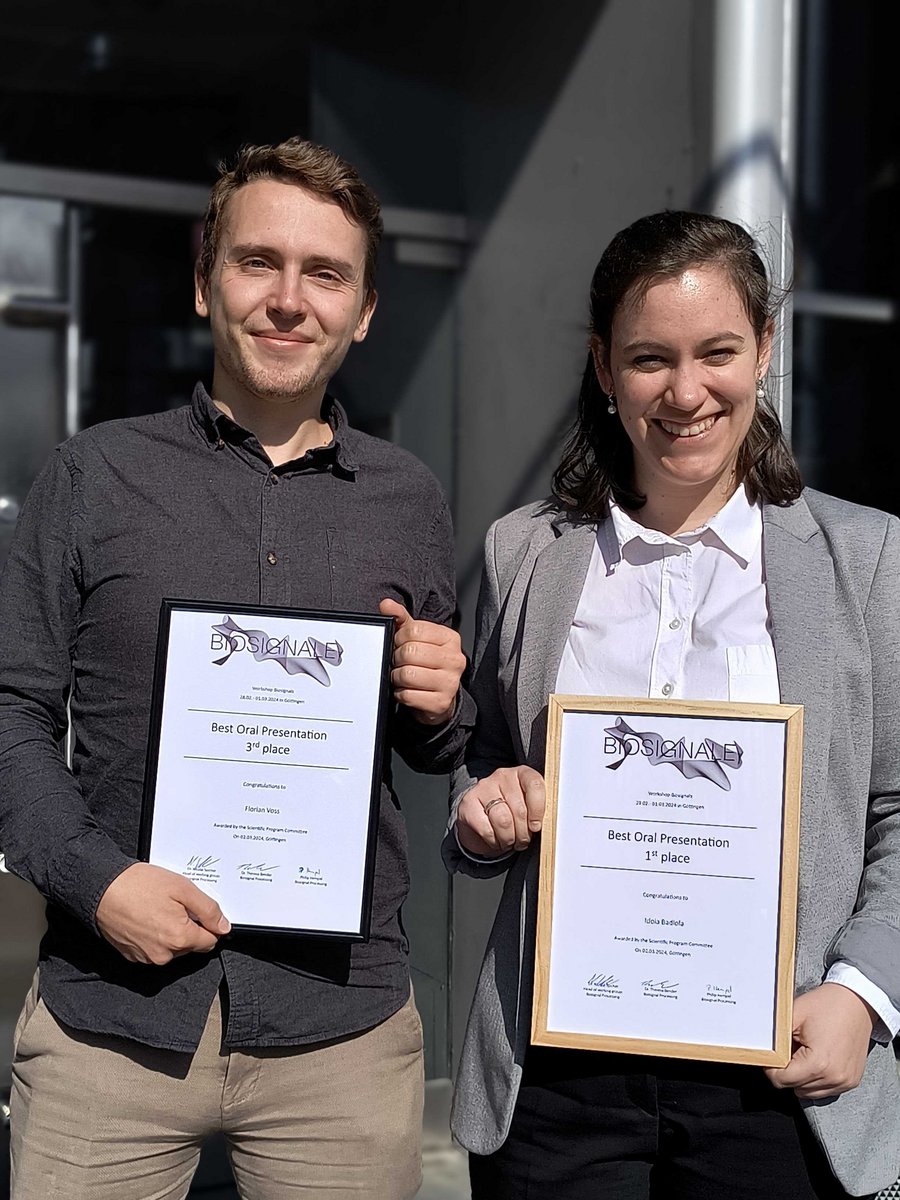
© Medical Information Technology (MedIT)
Idoia Badiola and Florian Voss from the Chair of Medical Information Technology (MedIT) at the Helmholtz Institute for Biomedical Engineering at RWTH Aachen University successfully participated at the Workshop Biosignals 2024, which took place from 28th February to 1st March in Göttingen.
The technical committees “Biosignals” and “Magnetic Methods in Medicine” of the German Society for Biomedical Engineering cordially invited all interested scientists, especially from the field of early career researchers, to the Workshop Biosignals.
Accepting the challenge Idoia was awarded the 1st place in the category “Best Oral Presentation” for her presentation “Mapping of peripheral venous hemodynamics using a low-cost camera: a proof-of-concept”. Florian achieved the 3rd place with his presentation “Camera Fusion for Improving Body Part Segmentation of Preterm Infants”.
“Congratulations to our colleagues Idoia Badiola and Florian Voss on their outstanding achievements”,
commented MedIT.
With this event, the committees are continuing a more than 20-year tradition of successful collaboration. Important components of the workshop were keynote speeches by young scientists as well as detailed poster presentations with short talks in which each submitted paper could be discussed constructively and critically. Submissions on biosignal analysis, biomagnetism and new related topics such as artificial intelligence and medical data science were welcome.
The event was hosted by the Biosignal Processing Group of the University Medical Centre Göttingen and supported by the Medical Image- and Signal Processing Working Group of the German Association for Medical Informatics, Biometry and Epidemiology.
“Special thanks go to the organisation team of the workshop, particularly Dr. Nicolai Spicher, Theresa Bender and Philip Hempel”,
added the Chair of Medical Information Technology.
Further information on the Workshop Biosignals can be found on the event’s homepage.
Find out more about the Chair of Medical Information Technology (MedIT) here.
BMBF supports “SPEED” project by Dr Weihan Li
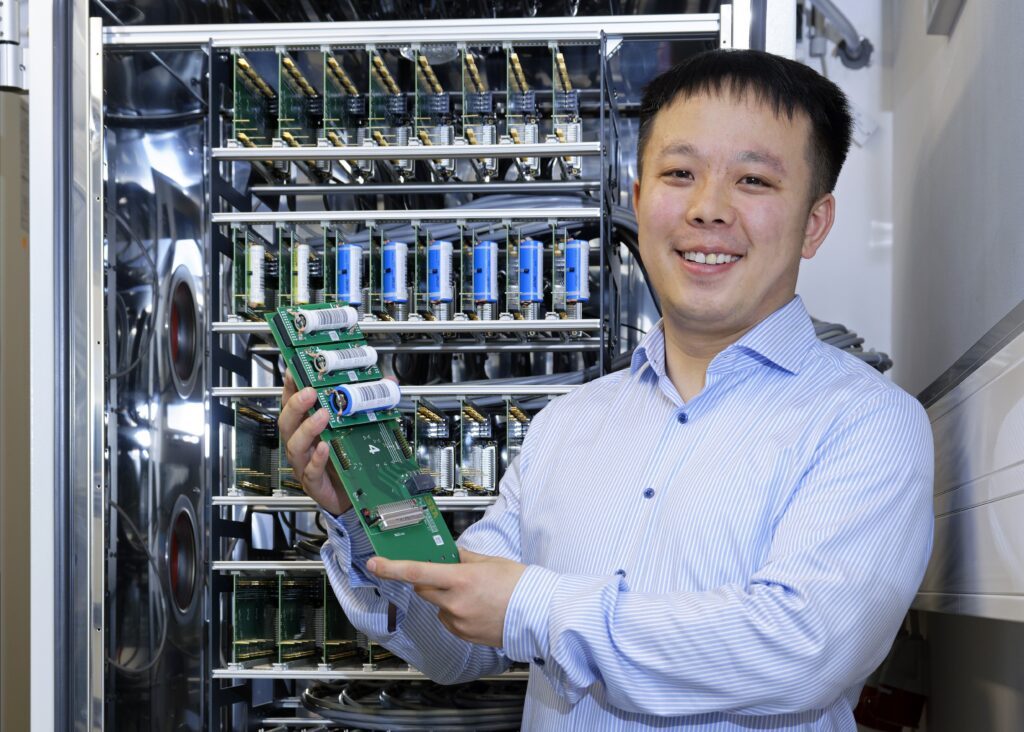
Dr. Weihan Li © Peter Winandy
The German Federal Ministry of Education and Research (BMBF) is funding Dr Weihan Li’s project “SPEED” – Rapid characterisation of the performance of lithium-ion batteries from the production line using machine learning” with 1.85 million euros over the next five years as part of its “BattFutur – Young Investigators Group Battery Research” competition.
At the Center for Ageing, Reliability and Lifetime Prediction of Electrochemical and Power Electronic Systems (CARL) at RWTH Aachen University, the junior research group ‘Artificial Intelligence for Batteries’ is pioneering the development of approaches to automate, digitalise, and accelerate the evaluation of battery performance from production lines using machine learning.
The ‘BattFutur’ funding initiative is part of the ‘Battery Research Factory’ concept, which is embedded in the ‘From Material to Innovation’ framework programme. This programme is a central pillar of the German government’s high-tech strategy. To attract excellent scientists in the field of battery technology to German science and industry, optimal starting conditions must be created. Therefore, promoting young scientists is essential.
Dr Weihan Li has led his junior research group since graduating with honours in Electrical Engineering and Information Technology from RWTH Aachen University in 2021. He completed his Master’s degree in Automotive Engineering and Transportation at RWTH in 2017, after earning his Bachelor’s degree in Automotive Engineering at Tongji University in 2014. Throughout his academic career, Dr Li has conducted research at esteemed institutions such as Imperial College London, the University of Oxford, and the Massachusetts Institute of Technology. He has received numerous awards, including the German Study Prize of the Körber Foundation, the Reichart Prize of the Akademie Gemeinnütziger Wissenschaften zu Erfurt, the vgbe Innovation Prize, the RWTH Innovation Prize, and the Battery Young Research Award.
Institute for Power Electronics and Electrical Drives (ISEA)


